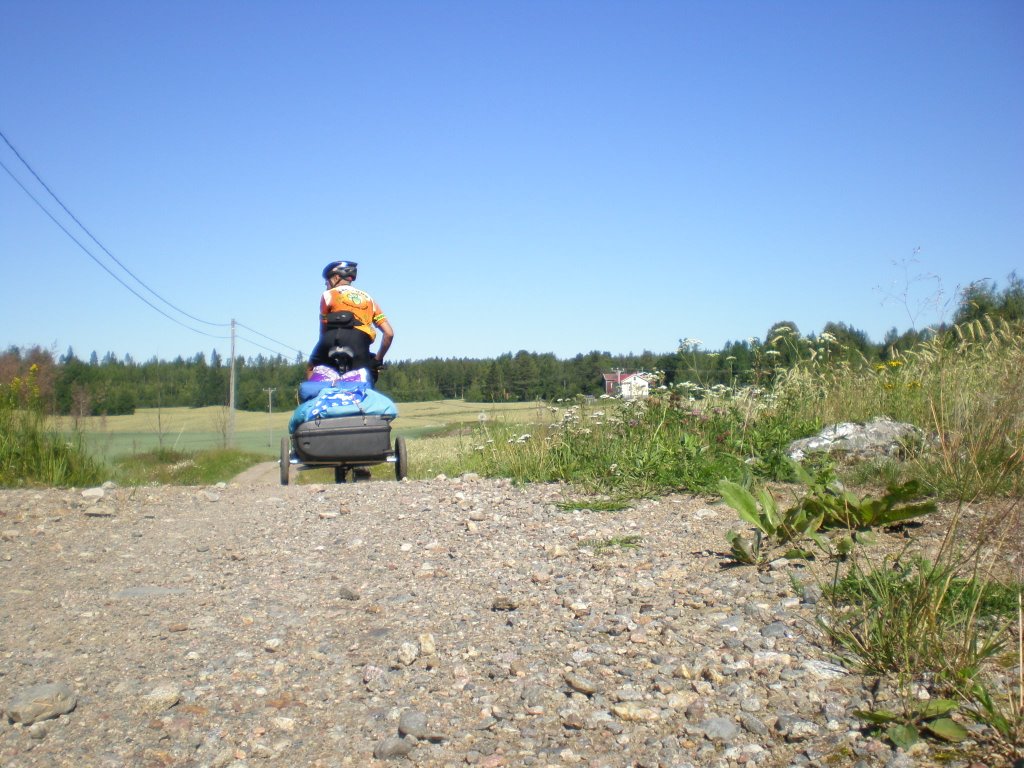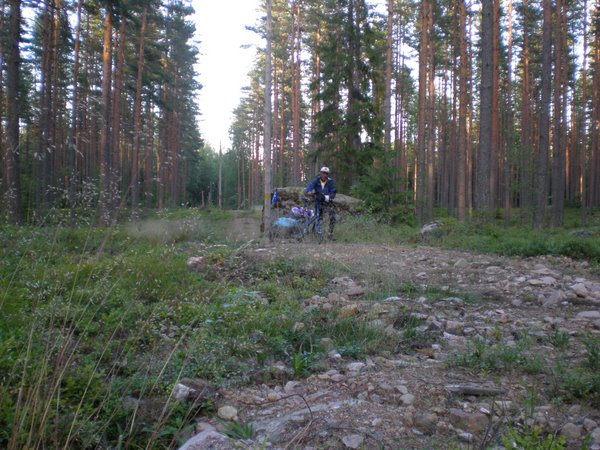
The rain continues all night, but in the early morning it stops. By 7 a.m. I have loaded the bike and begin a short ride through residential Vadso, past the church and then down the hill to the town center. Not a soul stirs in the early morning. The store are closed. I cross the bridge to the town quay. In the distance, I see a big ship slowly closing in on the dock. I wait on the quay in a large parking area next to a warehouse. Except for a sleepy forklift driver and a couple of dock hands, I am the only one waiting as the ship eases to the dock. I search for a place to buy a ticket, but there is no one to ask, and no place that even remotely resembles a ticket office. Seagulls whirl and dip overhead, cawing. Crew members throw huge ropes to the dock workers, who tie the lines to divets. A gang plank automatically lowers to the quay. A man in a uniform (the captain?) emerges. What do I say, "greetings earthman?"
I wait about ten minutes to see what happens, perhaps someone with a portable ticket machine will show. A few dazed passengers wander down the gang plank and into a small souvenir shop which has suddenly sprung to life in the warehouse. The forklife driver begins loading pallets of supplies from the warehouse into the hold of the ship. Time is ticking away and soon the ship will leave. I need to be on that ship, please don't leave me here! I park the bike and clamber up the gangplank where the captain still gazes resolutely at the empty quay.
"Where do I buy a ticket," I ask, assuming the captain, a man of the world, no doubt, speaks English.
"Inside the ship," he says. He points a ticket counter just inside the hatch way.
Of course, this makes perfect sense. Train and bus tickets can be purchased aboard their respective vehicles, why not on a ship?
I am soon at sea, the bike safely stowed in the hold along with a couple of cars and a lot of fish. The MS Vesteralen, one of the ships of the Hurtigruten Line that ply the northern waters servicing the small towns in Finmark, steams east toward Kirkness, the last town in Arctic Norway, a few miles east of the Russian border. On the deck, I watch as bleak islands of granite and moss pass, along with rusting Russian fishing trawlers, spewing black fumes. Clouds obscure cloak mountain tops on the mainland, but on the lower slopes a multitude of rivers cascade from unknown heights to the sea. Cormorants skivvy across the gray water.
Two hours later the ship arrives in Kirkenes. As I ride out of the hold I hear a voice exclaim, "look, a Bike Friday." I turn and bike toward two woman who are gesturing toward my bike. The woman, who are from Holland and who are waiting to board for the westward journey, are flabbergasted to see my folding bike.
I ride to the town center, park the bike at the tourist information office just as the rain plelts down. It is one of those morning where I'm not feeling like doing much. It is wet and cold outside. A few degrees colder and it will snow. So I take a tour of a World War II bombshelter. Kirkenes, which was occupied by the Germans at the onset of the war, was bombed 320 times by the Russians. The town is still honeycombed with underground cave-like shelters. The bombshelter provides some relief from the rain, but it's only 4 degrees centigrade inside.
After lunch at a fast food restaurant, I start cycling out of town, which means pedaling up a steep hill. On top of the hill is the decaying hulk of a steel mill. Kirkenes owes much of its existence to iron and nickel ore found in the nearby mountains. The steel mill closed a few years ago and seems to be in decay. Past the mill, and by a lake I come to the Frontier Museum. It's open and it's warm. I spend a long time here absorbing more information on Kirkenes' fate during World War II.
I've procrastinated enough. It's five miles over a mountain to the nearest campground. Part of the way is by bike path, which follows the shore of lake. The campground office is closed, but I call the number listed on the note and reach the owner. She agrees to drive to the office and rent me a cabin.
"We don't get much business this time of year," she tells me, as she unlocks the office.
"But it's still August," I say.
"Up here mid-August is usually when the weather starts deterioriating and it gets cold."
After renting the cabin, I am left with one more task. I am out of food. I unpack the bike, then ride back over the hills to the nearest grocery store. But uopn reaching the store I decide to bike all the way back to Kirkenes. Here, I ascend a hill for a view of the entire town and bay.
I wait about ten minutes to see what happens, perhaps someone with a portable ticket machine will show. A few dazed passengers wander down the gang plank and into a small souvenir shop which has suddenly sprung to life in the warehouse. The forklife driver begins loading pallets of supplies from the warehouse into the hold of the ship. Time is ticking away and soon the ship will leave. I need to be on that ship, please don't leave me here! I park the bike and clamber up the gangplank where the captain still gazes resolutely at the empty quay.
"Where do I buy a ticket," I ask, assuming the captain, a man of the world, no doubt, speaks English.
"Inside the ship," he says. He points a ticket counter just inside the hatch way.
Of course, this makes perfect sense. Train and bus tickets can be purchased aboard their respective vehicles, why not on a ship?
I am soon at sea, the bike safely stowed in the hold along with a couple of cars and a lot of fish. The MS Vesteralen, one of the ships of the Hurtigruten Line that ply the northern waters servicing the small towns in Finmark, steams east toward Kirkness, the last town in Arctic Norway, a few miles east of the Russian border. On the deck, I watch as bleak islands of granite and moss pass, along with rusting Russian fishing trawlers, spewing black fumes. Clouds obscure cloak mountain tops on the mainland, but on the lower slopes a multitude of rivers cascade from unknown heights to the sea. Cormorants skivvy across the gray water.
Two hours later the ship arrives in Kirkenes. As I ride out of the hold I hear a voice exclaim, "look, a Bike Friday." I turn and bike toward two woman who are gesturing toward my bike. The woman, who are from Holland and who are waiting to board for the westward journey, are flabbergasted to see my folding bike.
I ride to the town center, park the bike at the tourist information office just as the rain plelts down. It is one of those morning where I'm not feeling like doing much. It is wet and cold outside. A few degrees colder and it will snow. So I take a tour of a World War II bombshelter. Kirkenes, which was occupied by the Germans at the onset of the war, was bombed 320 times by the Russians. The town is still honeycombed with underground cave-like shelters. The bombshelter provides some relief from the rain, but it's only 4 degrees centigrade inside.
After lunch at a fast food restaurant, I start cycling out of town, which means pedaling up a steep hill. On top of the hill is the decaying hulk of a steel mill. Kirkenes owes much of its existence to iron and nickel ore found in the nearby mountains. The steel mill closed a few years ago and seems to be in decay. Past the mill, and by a lake I come to the Frontier Museum. It's open and it's warm. I spend a long time here absorbing more information on Kirkenes' fate during World War II.
I've procrastinated enough. It's five miles over a mountain to the nearest campground. Part of the way is by bike path, which follows the shore of lake. The campground office is closed, but I call the number listed on the note and reach the owner. She agrees to drive to the office and rent me a cabin.
"We don't get much business this time of year," she tells me, as she unlocks the office.
"But it's still August," I say.
"Up here mid-August is usually when the weather starts deterioriating and it gets cold."
After renting the cabin, I am left with one more task. I am out of food. I unpack the bike, then ride back over the hills to the nearest grocery store. But uopn reaching the store I decide to bike all the way back to Kirkenes. Here, I ascend a hill for a view of the entire town and bay.



No comments:
Post a Comment